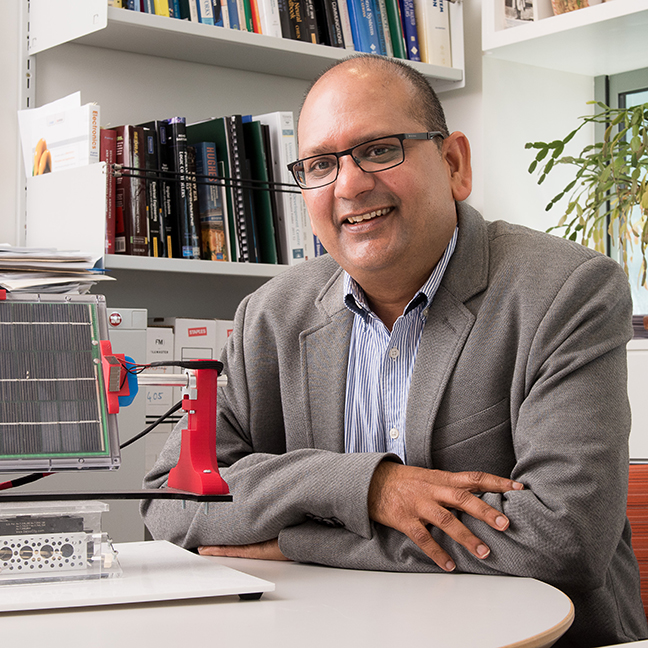RESE412 (2024) - Advanced Development of RE Systems
Prescription
This course presents techniques used to design advanced, integrated renewable energy solutions for given situations. The hardware and control enabling renewable energy systems to interact with a wider grid are presented along with topologies such as nano- and micro-grids. To supplement the technical content, this course presents the concepts of systems engineering, which introduces systems thinking principles.
Course learning objectives
Students who pass this course will be able to:
- Design advanced, integrated renewable energy solutions for given problems.
- Critically analyse renewable energy solutions and specific improvement opportunities.
- Build renewable energy systems.
- Justify solutions to different stakeholders through effective written and oral communication.
Course content
We’ve designed this course for in-person study, and to get the most of out it we strongly recommend you attend lectures on campus. Most assessment items, as well as tutorials/seminars/labs/workshops will only be available in person. Any exceptions for in-person attendance for assessment will be looked at on a case-by-case basis in exceptional circumstances, e.g., through disability services or by approval by the course coordinator.
If you started your programme of study remotely and can only study remotely, please contact the School so we can help and confirm what courses are available.
Withdrawal from Course
Withdrawal dates and process:
https://www.wgtn.ac.nz/students/study/course-additions-withdrawals
Lecturers

Daniel Burmester (Coordinator)
- daniel.burmester@vuw.ac.nz
- AM 404 Alan Macdiarmid Building, Gate 7, Kelburn Parade, Kelburn
Teaching Format
This course will be offered in-person and online. For students in Wellington, there will be a combination of in-person components and web/internet based resources. It will also be possible to take the course entirely online for those who cannot attend on campus, with all the components provided in-person also made available online.
The first half of the course will consist of weekly in-person lectures and lab sessions, which will also be recorded and available online. In the second half of the course, the emphasis will shift to practical work, during which time lectures will be replaced with additional in-person lab time and in-person tutorials.
Dates (trimester, teaching & break dates)
- Teaching: 26 February 2024 - 31 May 2024
- Break: 01 April 2024 - 14 April 2024
- Study period: 03 June 2024 - 06 June 2024
- Exam period: 07 June 2024 - 22 June 2024
Set Texts and Recommended Readings
Required
There are no required texts for this offering.
Mandatory Course Requirements
There are no mandatory course requirements for this course.
If you believe that exceptional circumstances may prevent you from meeting the mandatory course requirements, contact the Course Coordinator for advice as soon as possible.
Assessment
| Assessment Item | Due Date or Test Date | CLO(s) | Percentage |
|---|---|---|---|
| Assignment 1 | 22/03/2024 | CLO: 1,2,3 | 10% |
| Assignment 2 | 19/04/2024 | CLO: 1,2,4 | 30% |
| Assignment 3 | 24/05/2024 | CLO: 1,2 | 30% |
| Design project | 14/06/2024 | CLO: 1,2,3,4 | 30% |
Penalties
Work submitted after the due date will incur a penalty of 10% of the full mark per working day. Late work will not be marked after the model solutions have been made available or if more than one week late.
Extensions
Individual extensions will only be granted in exceptional personal circumstances, and should be discussed with the course coordinator before the deadline whenever possible. Documentation (e.g., medical certificate) may be requested.
Submission & Return
Assignments should be submitted via canvas, accessible through the course web pages.
Workload
RESE412 is a 15pt course and therefore has a nominal workload of 150 hours. An average week may take the following format:
- Lectures: 2 hours
- Reading and preparation: 1 hour
- Laboratory work: 3 hours
- Project work and assignments: 4 hours
Teaching Plan
Communication of Additional Information
All online material for this course can be accessed at https://ecs.wgtn.ac.nz/Courses/RESE412_2023T1/
Links to General Course Information
- Academic Integrity and Plagiarism: https://www.wgtn.ac.nz/students/study/exams/academic-integrity
- Academic Progress: https://www.wgtn.ac.nz/students/study/progress/academic-progess (including restrictions and non-engagement)
- Dates and deadlines: https://www.wgtn.ac.nz/students/study/dates
- Grades: https://www.wgtn.ac.nz/students/study/progress/grades
- Special passes: Refer to the Assessment Handbook, at https://www.wgtn.ac.nz/documents/policy/staff-policy/assessment-handbook.pdf
- Statutes and policies, e.g. Student Conduct Statute: https://www.wgtn.ac.nz/about/governance/strategy
- Student support: https://www.wgtn.ac.nz/students/support
- Students with disabilities: https://www.wgtn.ac.nz/st_services/disability/
- Student Charter: https://www.wgtn.ac.nz/learning-teaching/learning-partnerships/student-charter
- Student Feedback on University courses may be found at: http://www.cad.vuw.ac.nz/feedback/feedback_display.php
- Terms and Conditions: https://www.wgtn.ac.nz/study/apply-enrol/terms-conditions/student-contract
- Turnitin: http://www.cad.vuw.ac.nz/wiki/index.php/Turnitin
- University structure: https://www.wgtn.ac.nz/about/governance/structure
- The Use of Te Reo Māori for Assessment Policy:
Victoria University values te reo Māori. Students who wish to submit any of their assessments in te reo Māori must refer to The Use of Te Reo Māori for Assessment Policy
He mea nui te reo Māori ki te Whare Wānanga o te Ūpoko o te Ika. Ki te pīrangi koe ki te tuhituhi i ō aro matawai i roto i te reo Māori, tēnā me mātua whakapā atu ki te kaupapa here, The Use of Te Reo Māori for Assessment Policy - VUWSA: http://www.vuwsa.org.nz
Offering CRN: 31165
Points: 15
Prerequisites: (EEEN 313, 315) or
Corequisites: (one of RESE 421, 431)
Duration: 26 February 2024 - 23 June 2024
Starts: Trimester 1
Campus: Kelburn

